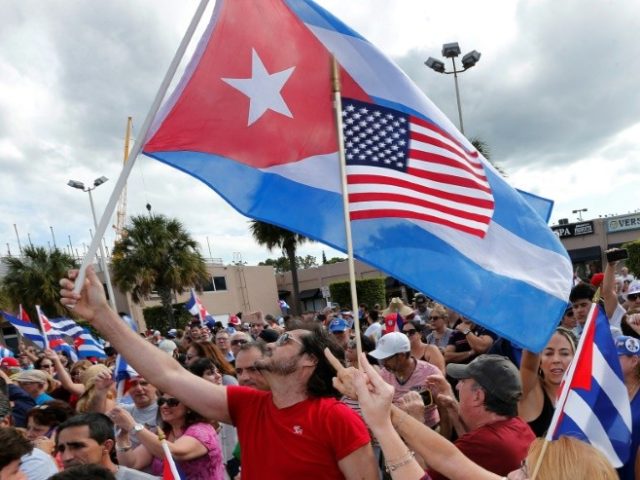WASHINGTON, D.C. — President Donald Trump is set to announce changes in United States policy toward Cuba on Friday, including renewed travel restrictions and efforts to prevent the flow of funds to the “repressive members of the Cuban military government.”
Multiple senior administration officials briefed reporters on the President’s new policies with regard to Cuba.
One senior administration official referenced the first-ever presidential endorsement from the Bay of Pigs Veterans Association in 2016, which endorsed then-candidate Trump.
“The President vowed to reverse the Obama Administration polices toward Cuba that have enriched the Cuban military regime and increased the repression on the island,” said the official. It is a promise that the President is keeping, said this official.
The official emphasized that the new policy does not target the Cuban people, but rather the “repressive members of the Cuban military government.”
Trump is restoring some of the restrictions on Cuba “until they’ve provided religious and political freedom to their people,” according to one of the officials.
In February, Trump ordered a full review of U.S. policy toward Cuba, according to one of the senior officials. The National Security Council conducted an inter-agency review that included, among others, the Treasury Department, State Department, Commerce Department, Department of Agriculture, Department of Homeland Security and Department of Transportation. Multiple members of Congress considered experts on Cuba policy, and from both sides of the aisle, worked “hand in glove” to provide guidance on this new policy. The only lawmaker named was Sen. Marco Rubio, and only after the officials were directly asked about the senator.
The official said that Trump has tasked his cabinet with working to “find ways to improve what we consider President Obama’s bad deal.”
The President’s concern with previous policy was that it was “enriching the Cuban military and the intelligence services that contribute so much to oppression on the island, and that’s the opposite of what he wanted to achieve, which is to have the benefits of any economic commerce with United States go to the Cuban people,” according to one senior official.
It was made clear during the briefing that “there will not be a change to the wet foot, dry foot current policy.”
An official said the administration hopes to see the Cuban regime implement reforms spoken of in years prior, but have not been.
The new policy includes measures to make sure that the “statutory ban on tourism is strictly enforced.” Of twelve categories of travel permitted when it comes to Cuba, the administration is ending “individual people to people travel.” This category was identified as the having the highest possibility for abuse. One official later clarified that tourism is banned and has been banned under American law for years. Commercial flights will still be allowed to Cuba.
Asked about “self-certification,” one official said, “we’ll still allow Treasury to issue the general licenses that it has issued,” but that individuals will still be responsible for keeping financial transactions and travel records in case of an audit.
Americans can still go to the country through a tour, but not on their own.
One official spoke of several other components of the new policy that will be revealed on Friday.
The new policy directs the Secretaries of Treasury and Commerce to change their regulations on the topic of Cuba and the departments are directed to provide regulations to “prohibit direct financial transactions with the military, intelligence and security services” with several exceptions.
The policy goes into effect on Friday, but also directs the creation of new regulations. Impact will be seen once those regulations have been created and go into effect.
Asked about whether there were any plans for official diplomatic relations with Cuba, a senior official said nothing has changed with regard to that policy.
Asked whether Cuba will be redesigned as a sponsor of terrorism, an official replied that that was “not in this.”
Asked about U.S. fugitives living in Cuba, an official replied, “The new policy reiterates the importance of extraditing those fugitives and returning them to justice and has asked the Attorney General to submit a report on those efforts.”
Asked about what goods could be brought back from the nation of Cuba, such as cigars and rum, an official there said there was no change in currently allowed items.
Asked about the operation of Airbnb in Cuba, a senior administration official said that they were calling it “the Airbnb economy.” Some of the details become complicated related to how money is transferred, but the execution of the new policy involves working out the complicated details.
As part of the policy, the State Department will be expected to produce a list of businesses owned by the Cuban government.
Another official told Breitbart News that it is likely that President Trump will make reference to countries with which the Cuban government does business. Trump is likely, though not guaranteed, to make reference to the involvement of the Cuban government to countries like North Korea and Venezuela.
An official reiterated that the goal of the new policy is to “steer money away from the Cuban military and toward the Cuban people.”
Follow Michelle Moons on Twitter @MichelleDiana

COMMENTS
Please let us know if you're having issues with commenting.